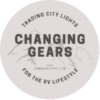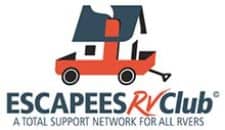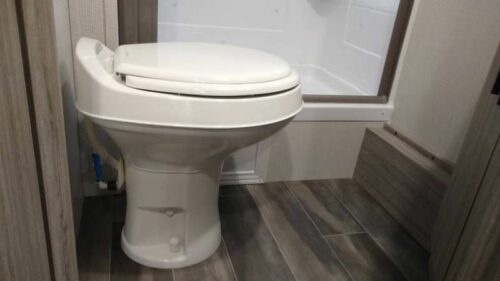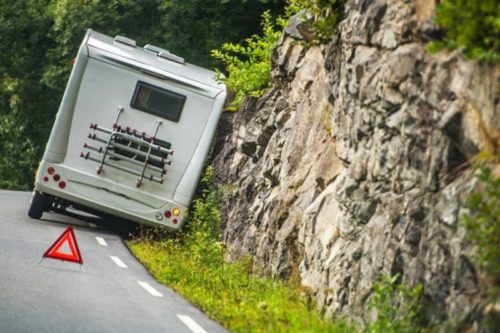Gawking eyes of neighboring campers and remembering which way to turn the wheel are just a couple reasons people dread backing up a camper. Knowing how to back up a travel trailer into all sorts of campsite layouts has been frustrating, challenging and rewarding. I reduce the stress of backing up my travel trailer by starting the process way before I get to the campground. No, I’m not driving hundreds of miles backwards, my process starts with the planning.
HOW TO PICK THE IDEAL CAMPSITE?
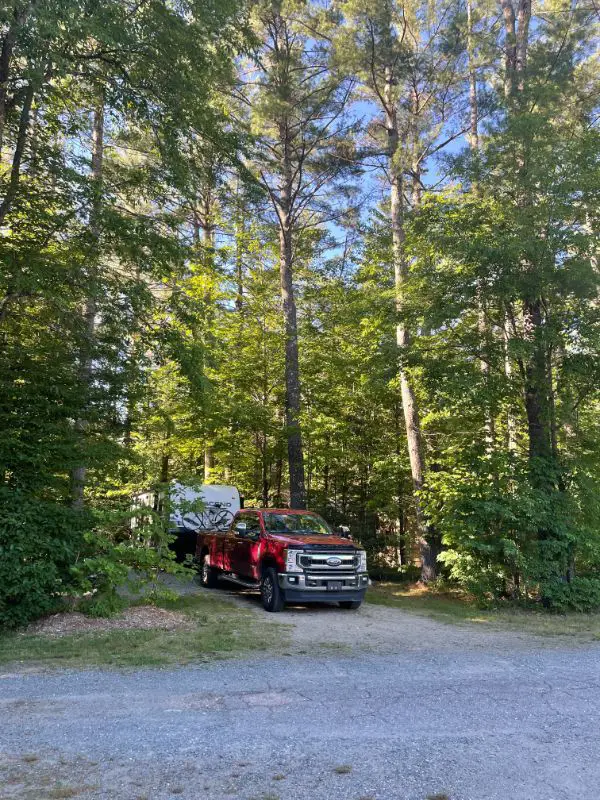
When researching campgrounds, I spend a lot of time visualizing our experience. Part of that experience is successfully parking the trailer with as little stress as possible. If tensions rise while backing up the trailer, well, let’s just say “I don’t want to sleep on an RV couch.”
- I know if my RV and tow vehicle will fit in my campsite. We recently had to make a last-minute change to a reservation. We meaning “me” may have overlooked the fine print that stated “vehicles must be under 42’ to cross a narrow bridge that leads to our loop.
- I know if the site is back in or pull through.
- Proximity to campground amenities
- Bathrooms, showers and dump station – As close as possible if we don’t have full hook ups. Six people and one restroom in our trailer, I’m sure you understand.
- Playgrounds, beaches, trails – I have four kids I’m going to be hauling back and forth, this stuff is important.
- Laundry – Did I mention I have four kids?
- Proximity to neighbors – we love meeting new people on the road and seeing our kids make fast friends with fellow campers. We homeschool so we try and balance privacy and the ability to socialize.
THE BEST WAY TO RESERVE A CAMPSITE
- Reserve your site over the phone. Yes, people still call people on the phone. This allows you to ask for the best site for your specific needs and get to know more about the campground.
- Reserve your campsite online. If you chose to reserve your campsite online, you may want to do additional research.
- Look for photos. If the campground website does not provide photos, try using Campsite Photos or a google search and select images. If someone did not like something, you can guarantee you can find it on the internet.
- Review the campground map. You can usually find these on the campgrounds website or a simple google search.
- Read reviews. I’m partial to RVLife. RVLife is subscription service that provides you access to campground searches, RV GPS, trip planning and maintenance schedules. Free options include The Dyrt and Campground Reviews. Be careful, some reviews are so funny you may find you just lost 4 hours of your life reading them for campgrounds you will never visit.
TYPES OF CAMPGROUND RESERVATIONS
In our travels, we have run into four different types of reservations. I have these ranked in order of preference:
| Site Type | Description | Park Types | Good to Know |
|---|---|---|---|
| Site-specific | Pre-assigned site | State parks, federal campgrounds and some private. | May cost extra. Best for those that like to plan head. |
| Site type | Site is assigned or you pick when you arrive. | KOA and other private campgrounds. | Try to arrive when it’s less busy (M-Th) |
| Pick your own | Pick a site when you arrive. Site is guaranteed; hookups aren’t. | Thousand Trails | Budget-conscious, planners and free spirits. |
| First-come, first-served! | Reservation is made upon arrival. You pick from what’s left. | State parks, federal campgrounds and some private. | This makes me nervous just thinking about it! |
ARRIVING AT THE CAMPGROUND
Most of the time, you check-in with someone at the campground and they will provide you the best route to your site. If they do not, ask them. Ask as many questions as you need until you are comfortable with the approach. Going the wrong way down a one way or hitting a dead-end can just add to the stress of getting backed in and set up.
Sometimes you are on your own. In these instances, I would offer two critical pieces of advice.
- Do your research. I always try and familiarize myself with the route and the campground map before departure. Arriving at the site can be chaotic and stressful. This is when mistakes are made so try and prepare yourself.
- Take your time – No need to be in a rush. Go slow as you drive through the campground. This is not only safe it is smart. Some campgrounds are not marked very well. Look at this one below. Can you tell which one is a campsite and which one is a road? What if it was at night? You do not want to back up more than you must.
GOAL – Get Out and Look
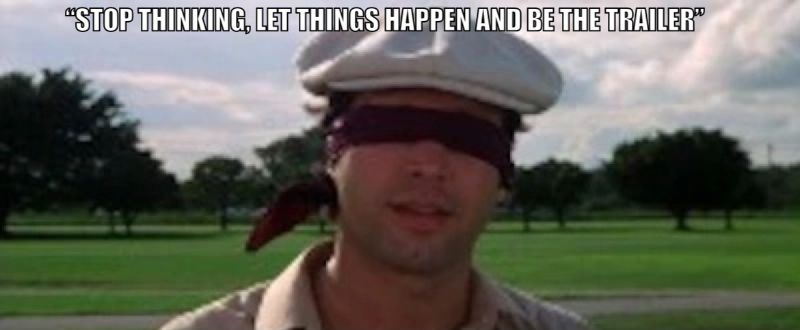
Chris, a fellow full timer, shared this one with me. I had been doing this all along, I just did not have a cool acronym to go along with it. The one time I couldn’t use GOAL (due to a steep incline) ended with an hour-long parking experience, a scraped up front end of my tow vehicle and a new friend named Jim.
As you are walking your campsite, preparing to park your trailer…
- Come to an agreement with your spotter on the path of the trailer and where you want it located. A spotter is a secondary person who will provide you direction as you back up the camper. I’ll talk more about the importance of a spotter in a bit. Just remember, spotter says and driver does.
- Obstructions – low tree branches, trees, picnic tables, bears. We often move picnic tables clear out of the way. It is just one less thing for us to worry about hitting. Do not attempt to move bears.
- Proximity to sewer, water and electric hookups. Make sure everything reaches! If you already parked, you’ll have a few options and none of them are great. Do without said utility for the remainder of your stay, pack up and reposition the trailer or visit the camp store and pay an exorbitant amount for a longer hose or power cable.
- Will your slides and awnings be able to extend fully without obstruction? I highly recommend having someone outside while someone inside is opening the slide.
- How much leveling side to side will be needed? Will you be backing over leveling blocks or driving forward over them? Both will impact your proximity to your hookups.
- Are you going to be able to get out? Just because you got in, does not mean it will be easy to get out. Think about hooking up your trailer and your departure. Give yourself the best angle or at least some options for a safe departure or you may be worrying about it until you leave.
Positioning Yourself to Backup
When backing into a campsite, straighter is better. I prefer to line our truck and trailer up in a way that is going to give me the straightest shot for backing up. You got this!
If the angle doesn’t matter, I pull up, so the campsite is on the driver’s side. This allows me to look out the window if needed. If you have a sharp angle as seen below, it may require more straightening out to get properly angled. Also, if you turn too hard, you could jackknife the trailer. This could damage your vehicle or trailer as well as making it more difficult to back up straight.
Best Backing up Advice from Full-Timers
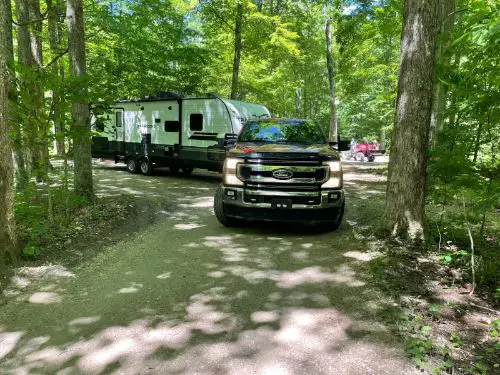
I reached out to some trusted experts, who are also friends, to get their best advice for backing up a trailer. Once I filtered through the sarcasm and short jokes, I was able to put a solid list together of great advice.
- Use a spotter – Backing up a trailer should be part of pre-marital counseling. If a man and a woman can get through this process without screaming at each other, they can get through anything.
- Communicate with your spotter – You can use phones, walkie talkies or hand signals. Don’t go rogue! If there is confusion between you and the spotter, put the truck in park, get out and tell them you love them. If your spotter is a stranger, you may just want to compliment them.
- Hand Signals – Hand signals are a great option. Just be sure the driver and the spotter are on the same page. Remind the spotter to stay in the view of mirrors and keep the hand signals simple. If you get “the bird”, this is a signal that you will most likely be baking up on your own.
- Listen to your spotter. The best advice I received about communication between driver and spotter was “turn off your brain and listen to your spotter”. If your spotter is your wife, this advice translates to all aspects of life.
- Position your hand at the bottom of the wheel – If you want the trailer to go right, turn your hand to the right. If you want the trailer to go left. This can quickly go out the window once you turn a few times. Take a deep breath and reposition your hand and the wheels and start over.
- GOAL – Get out and look. This is worth repeating.
- Don’t get yourself turned too sharp. If this happens, no matter what you do the trailer is going to go the way of the turn since you’ve exceeded the pivot point. Don’t panic, just pull forward to straighten out and begin to make slow snake like movements (a little left and a little right) until you get you into the best position.
Windows down. Radio off and only one person as the spotter. Hand at the bottom of the wheel (as mentioned above). Finally, while yelling at each other during all of this, remember others in the campground are listening so try to keep it clean. - Don’t be in a hurry and don’t worry about people watching you. The thoughts you conjure up in your mind are far worse than reality. In my experiences, any time I’ve run into some challenges backing up, I’ve had people offer to move their vehicles or offer assistance backing up (like my new friend Jim). An extra set of eyes for getting into a tough spot is always welcomed.
The process of backing up a trailer is difficult to grasp, especially if you lack experience but if you can get it right it is an amazing feeling. Successfully backing up a trailer can provide you with the confidence to take on life’s greatest challenges
Full-time RVer, husband, father, son, brother, friend and dreamer. I am officially “living the dream:” traveling the country with my amazing wife, four awesome kids, and beloved boxer in our 150-sf RV. Each day we are learning, laughing, (maybe a little yelling) and finding the good in this world.
-
Michael Huffhttps://changingears.com/author/michael-huff/
-
Michael Huffhttps://changingears.com/author/michael-huff/
-
Michael Huffhttps://changingears.com/author/michael-huff/
-
Michael Huffhttps://changingears.com/author/michael-huff/
